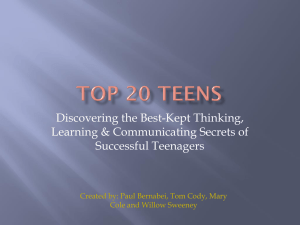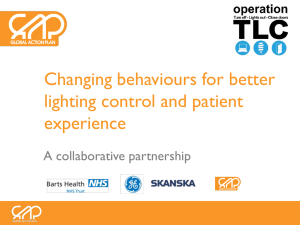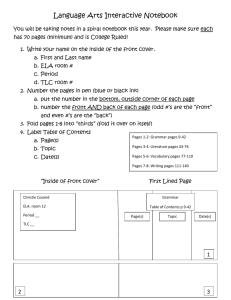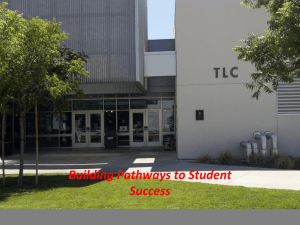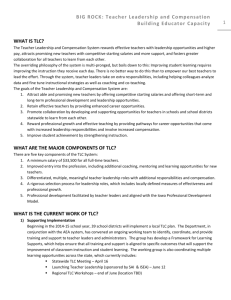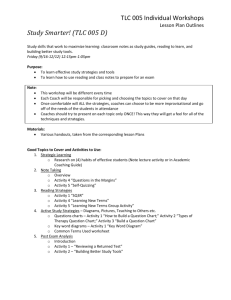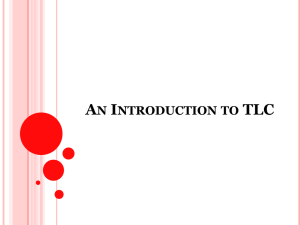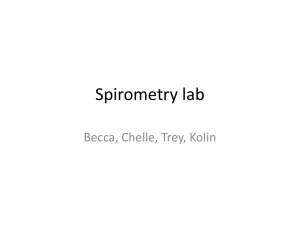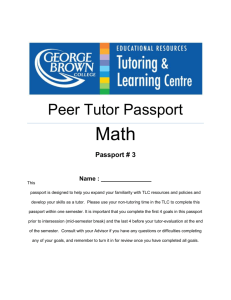Part II - University of Hawai`i Maui College
advertisement
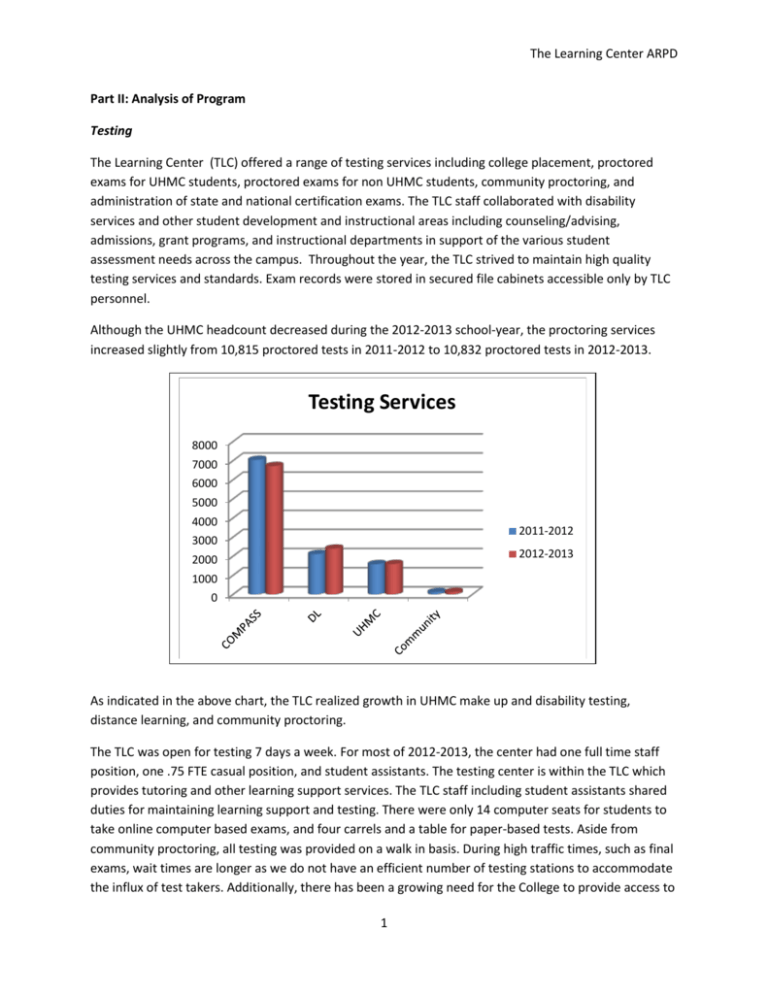
The Learning Center ARPD Part II: Analysis of Program Testing The Learning Center (TLC) offered a range of testing services including college placement, proctored exams for UHMC students, proctored exams for non UHMC students, community proctoring, and administration of state and national certification exams. The TLC staff collaborated with disability services and other student development and instructional areas including counseling/advising, admissions, grant programs, and instructional departments in support of the various student assessment needs across the campus. Throughout the year, the TLC strived to maintain high quality testing services and standards. Exam records were stored in secured file cabinets accessible only by TLC personnel. Although the UHMC headcount decreased during the 2012-2013 school-year, the proctoring services increased slightly from 10,815 proctored tests in 2011-2012 to 10,832 proctored tests in 2012-2013. Testing Services 8000 7000 6000 5000 4000 2011-2012 3000 2012-2013 2000 1000 0 As indicated in the above chart, the TLC realized growth in UHMC make up and disability testing, distance learning, and community proctoring. The TLC was open for testing 7 days a week. For most of 2012-2013, the center had one full time staff position, one .75 FTE casual position, and student assistants. The testing center is within the TLC which provides tutoring and other learning support services. The TLC staff including student assistants shared duties for maintaining learning support and testing. There were only 14 computer seats for students to take online computer based exams, and four carrels and a table for paper-based tests. Aside from community proctoring, all testing was provided on a walk in basis. During high traffic times, such as final exams, wait times are longer as we do not have an efficient number of testing stations to accommodate the influx of test takers. Additionally, there has been a growing need for the College to provide access to 1 The Learning Center ARPD more industry certification exams including ASE (Automotive Service Excellence), testing for the Department of Public Safety, and other healthcare certifications. It has been difficult to meet the growing community needs while balancing the increasing UHCC distance learning testing and the UHMC makeup and disability testing with so few testing stations. Overall data from the TLC satisfaction survey indicated that 94% of respondents felt the testing services were very good or excellent. Learning Center Tutoring The Learning Center (TLC) provided technological resources, tutoring, learning strategy workshops, supplemental instruction, and a study area for UHMC students. In 2012-2013, 2,431 students (unduplicated) utilized the services in the TLC which was open 7 days a week. Since the incarnation of the TLC, the peer tutoring program has been one of the primary functions; although the TLC is not the only program on campus that provides tutoring. Within the budget, the TLC tried to offer tutoring for every subject area requested. To become a peer tutor, a student must have gotten a faculty referral, received an A or B grade in the subject, and participated in pre tutor training and weekly in-service training sessions. Tutoring sessions are 30 minutes in length and required an appointment. The TLC tutors provided 1,140 tutorial sessions during the 2012-2013 school-year. In addition to providing face to face tutoring, the College also provided access to online tutoring services through Smarthinking. Total Hours In fall 2012, in an effort to increase the success of students enrolled in developmental math and English courses, the campus provided in-class tutors who assisted students during class time. Many of the math and writing faculty modified their instruction to provide a “workshop” environment where tutors worked with students one on one or in small groups. The in-class tutors were funded through grant monies. 2000 1500 1000 500 0 1524 810 718 Total Hours On a recent TLC survey, 80% of respondents perceived that tutoring helped to improve their grade, and 75% of respondents felt online tutoring was helpful. On the 2012 CCSSE, 78% of respondents indicated that tutoring was an important service that the College provides. 27% indicated that they frequently used tutoring services, and 41% indicated they were satisfied with the tutoring services. On the other hand, 47% indicated that they rarely or never used tutoring which suggests the TLC needs to continue to focus on marketing learning support services and integrating learning support into courses. 2 The Learning Center ARPD Orientations and Learning Strategy Workshops It is important to introduce the TLC to as many students as possible. To this end, for the first 3 weeks of fall 2012 and spring 2013 semesters, the TLC staff provided 20 minute orientations to classes including developmental English, Culinary, ENG 100, Psychology and Social Sciences. The TLC also offered Learning Strategy Workshops including note taking, study keys, test taking, time management, writing a research paper, and understanding plagiarism. Staff provided these workshops in the TLC and in classes upon request from faculty. Workshops delivered in class are tailored to meet the needs of the students and discipline, for example, test taking for automotive students or writing a research paper for agriculture. Learning Strategy Workshop Evaluations 100% 99% 98% 97% 96% 95% 94% 93% 92% Very useful strategies introduced Very likely to use strategies Based on workshop evaluations, 95% or more of respondents indicated that very useful strategies were introduced in the workshops and that they were very likely to use the strategies in their courses. Computer Lab and Study Area During the 2012-2013 school-year, the TLC’s computer lab had 30 computers (both Mac and PCs). Students also had access to a scanner, printer and copier. The TLC staff provided impromptu tutoring sessions on basic computer usage, Laulima, and STAR since many students were using computers, the UH course management and academic planning systems for the first time. The TLC worked with the IT department to ensure the computer software was up to date and relevant to the courses taught during the fall and spring semesters. 3 The Learning Center ARPD In the past year, the TLC provided an inviting place to study both individually and in small groups. Many faculty had textbooks and other resources on reserve at the TLC for students to access. The TLC also provided a quiet room that students could reserve so they could test or study in a distraction free environment. Overall, the TLC’s staff and student assistants were and are its greatest strength. They worked hard to create a friendly and welcoming place where students felt comfortable using the resources and seeking help. 2012 CCSE data indicated that 50% of respondents were utilizing the TLC lab or other skills labs on campus, and 81% indicated that the skill labs on campus were important for their education. Part III Action Plan Testing Program improvements such as weekend test availability and updated technology have improved access and services for the TLC testing center users. However, testing is offered on a drop in basis and wait times increase during high volume testing periods. Additionally, increasing access to more types of industry certifications is becoming an important function of the testing center. Lastly, increasing the quality of test administration is imperative as a post-secondary testing center. The following action plan articulates how the TLC testing center plans to move forward. Activity Increase # of test stations by 4 Person(s) Responsible TLC Director Increase number of industry certification tests proctored by 4 Implement National College Testing Association Standards and Guidelines for Post Secondary test centers Testing Coordinator and TLC Director Testing Coordinator and TLC Director Timeframe Add two computer stations by end of 2013. Add two computer stations by May 2014. Completed by May 2014 In process by May 2014 The Learning Center Like testing, the TLC has improved student access by expanding hours of operation including weekends. The TLC offers tutoring, learning strategy workshops, computers, printing, and study area access 7 days a week. Increasing usage of the TLCs resources including tutoring remains the primary focus, as well as, providing professional development for staff, so they can keep abreast of effective practices and changing pedagogy. The following action plan articulates how the TLC plans to move forward. Activity Develop stronger partnerships with instructional and student services faculty to integrate TLC services into course Person(s) Responsible TLC Director 4 Timeframe In process by May 2014 The Learning Center ARPD requirements and early alert systems. Implement a tutor certification program that identifies standards and benchmarks for tutoring programs. Implement Online Learning Strategy Workshops so they are more accessible to students. Tutoring/Technology Coordinator and TLC Director In process by May 2014 Tutoring/Technology Coordinator and TLC Director Completed by May 2014 Part IV: Resource Implications Testing The TLC’s testing center’s usage continues to increase, and as such, continued funding for trained proctors and test security is imperative. Additionally, as the needs for computer-based testing continue to grow, the testing center will need to expand accordingly by replacing the paper-based test cubicles with computer stations. The Learning Center The TLC provides necessary resources and learning support for UHMC students. As previously discussed, the TLC provides tutoring (at the TLC and in-class), learning strategy workshops, computers, and study areas. The testing center is part of the TLC, and staff share TLC and proctoring responsibilities. As of February 2013, the TLC and testing staff consist of a .5 FTE Director, a 1.0 FTE testing coordinator, and a .75 FTE casual hire who acts as the TLC’s Tutor and Technology Coordinator. The casual position is being paid through grant funds. The TLC is requesting that the Tutor and Technology Coordinator become a 1.0 FTE regularly funded position so we can upgrade our tutor training program, implement online learning strategy workshops, and maintain technology in both the computer lab and testing center. 5
